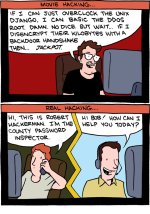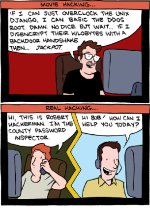lpetrich
Contributor
Baltimore’s ransomware attack, explained - Vox
Baltimore City Ransomware Attack Knocks City Services Offline : NPR
Baltimore city government computer network hit by ransomware attack - Baltimore Sun
From the first link:
From the third link, “We won’t talk more, all we know is MONEY!” the note said. “Hurry up! Tik Tak, Tik Tak, Tik Tak!”
Baltimore City Ransomware Attack Knocks City Services Offline : NPR
Baltimore city government computer network hit by ransomware attack - Baltimore Sun
From the first link:
Thirteen bitcoins are standing between the city of Baltimore and many of the services and processes its citizens rely on after hackers seized thousands of government computers at the start of the month. The ordeal has been going on for two weeks, and there’s no clear end in sight.
Here’s what’s happening: On May 7, hackers digitally seized about 10,000 Baltimore government computers and demanded around $100,000 worth in bitcoins to free them back up. It’s a so-called “ransomware” attack, where hackers deploy malicious software to block access to or take over a computer system until the owner of that system pays a ransom.
Baltimore, like several other cities that have been hit by such attacks over the past two years, is refusing to pay up. As a result, for two weeks, city employees have been locked out of their email accounts and citizens have been unable to access essential services, including websites where they pay their water bills, property taxes, and parking tickets. This is Baltimore’s second ransomware attack in about 15 months: Last year, a separate attack shut down the city’s 911 system for about a day. Baltimore has come under scrutiny for its handling of both attacks.
The ransomware attacks in Baltimore and other local governments across the US demonstrate that as ransomware attacks spread, and as common targets such as hospitals and schools beef up their online systems’ security, there are still plenty targets vulnerable to this kind of hack. It also exemplifies the conundrum that ransomware victims face: pay up and get your access back, or refuse — potentially costing much more in the long run.
From the third link, “We won’t talk more, all we know is MONEY!” the note said. “Hurry up! Tik Tak, Tik Tak, Tik Tak!”


